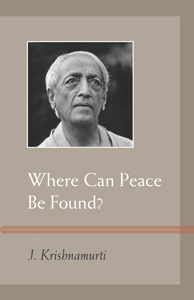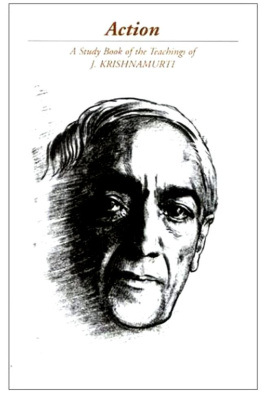Krishnamurti - Krishnamurti at Los Alamos 1984
Here you can read online Krishnamurti - Krishnamurti at Los Alamos 1984 full text of the book (entire story) in english for free. Download pdf and epub, get meaning, cover and reviews about this ebook. publisher: Krishnamurti Foundation Trust, genre: Religion. Description of the work, (preface) as well as reviews are available. Best literature library LitArk.com created for fans of good reading and offers a wide selection of genres:
Romance novel
Science fiction
Adventure
Detective
Science
History
Home and family
Prose
Art
Politics
Computer
Non-fiction
Religion
Business
Children
Humor
Choose a favorite category and find really read worthwhile books. Enjoy immersion in the world of imagination, feel the emotions of the characters or learn something new for yourself, make an fascinating discovery.

- Book:Krishnamurti at Los Alamos 1984
- Author:
- Publisher:Krishnamurti Foundation Trust
- Genre:
- Rating:4 / 5
- Favourites:Add to favourites
- Your mark:
- 80
- 1
- 2
- 3
- 4
- 5
Krishnamurti at Los Alamos 1984: summary, description and annotation
We offer to read an annotation, description, summary or preface (depends on what the author of the book "Krishnamurti at Los Alamos 1984" wrote himself). If you haven't found the necessary information about the book — write in the comments, we will try to find it.
Krishnamurti at Los Alamos 1984 — read online for free the complete book (whole text) full work
Below is the text of the book, divided by pages. System saving the place of the last page read, allows you to conveniently read the book "Krishnamurti at Los Alamos 1984" online for free, without having to search again every time where you left off. Put a bookmark, and you can go to the page where you finished reading at any time.
Font size:
Interval:
Bookmark:
Krishnamurti at Los Alamos 1984
Copyright 1985 Krishnamurti Foundation Trust Ltd
KRISHNAMURTI
AT LOS ALAMOS 1984
Contents
20th March 1984
21st March 1984
Thought Can Never Be Creative
M.R. Raju: It is a privilege for me to introduce our speaker today... but, Mr Krishnamurti needs no introduction. He is a world-renowned teacher. He has been giving lectures around the world for nearly sixty years now. The more than thirty books which he has had published are never out of date; they maintain their freshness. Dr Oppenheimer was a philosopher-scientist and a Sanskrit scholar. It is a most happy occasion, on the day of the official beginning of the spring today, to have Mr Krishnamurti as our colloquium speaker. On behalf of the Laboratory, I want to express our appreciation to him for accepting our invitation, in spite of his busy schedule. So without taking any more precious time from the speaker, I invite Mr Krishnamurti to give his presentation. The title of the presentation is Creativity in Science. Thank you very much for your attention.
Sir, may I request you to present your talk?
K RISHNAMURTI : If I may say so, this is not a lecture. This is a conversation between you and the speaker. The subject, I believe, is Creativity in Science. Science, generally, means knowledge, accumulated knowledge through two or three hundred years, and increases more and more knowledge. And what relationship has creativity with knowledge? That is the subject I have been asked to talk about.
What is knowledge? It is acquired through thousands of years through experience, stored in the brain as knowledge and memory. And from that memory thought arises. So knowledge is limited always, whether now or in the future. And so thought is always limited. And where there is limitation there is conflict. So what place has creativity with regard to science? Is there a relationship at all? Please, we are thinking together, we are questioning the very source, the very accumulative process of knowledge. Science means knowledgeLatin and so on. And can creativity in its deepest sense, in its profound activity, what place has creativity or creation with regard to knowledge? We have given tremendous importance to knowledge, from the ancient times, from China, India, before the Christian civilization came into being they were tremendously respectful, worshipped knowledge. And knowledge, as we said before, is always limited because it is based on experience and so memory, thought, is limited. Thought has created the most extraordinary things in the worldall the great monuments, from the ancient of times, great art, vast technology in the present day, and the creation of a nuclear bomb and so on. Thought has brought about an extraordinary state in the world. Thought has created God, built the vast cathedrals of Europe, all the things that are in the museumspoetry, statues, and all the marvellous things that thought has done. Because thought is the outcome of knowledge, knowledge is science, expressed technologically or otherwise. Thought also has created warsand we are faced with another war, maybe. And human beings for the last five thousand or more years have been killing each other in the name of God, in the name of peace, in the name of their own particular tribal country. Man has destroyed other human beings, now, in the present civilization where we are gathered here, where they are producing these enormous destructive things. That is the result of science, which is knowledge.
So what place has knowledge, science, in creation? Creation has been one of the most complex problems. Various religions say this is the source of creation, God, and so on. Each tribal country, which is called nationalism, has its own particular expression, has its own tribal gods. And science which has produced extraordinary, marvellous things in the world, communication, computers, medicine, surgery, all that has been the result of thought, going to the moon and so on. So can thought ever be creative, in its most profound sense? What is creation? Must creation be always expressed, manifested? That which is manifested must be limited. We are the result of tremendous years, or centuries of endeavour, conflict, struggle, pain, sorrow; we are the result of all that. Our brains have infinite capacity, but it has been conditioned, not only religiously, but also nationally. You are all Americans, Chinese, Russians, and so on. We have divided the world geographically, religiously, culturally; and also we have divided human beingsthe caucasians, the blacks and the browns, like us. And so thought has brought about tremendous conflict between human beingsthat is a factnot only between individuals, but also collectively. We have also suffered through wars, through pestilence, every form of disease. And science has been able to help or cure some of all that. But also science has produced most destructive instruments of war. Before you killed a man, perhaps in a war, two or three hundred people, or more; now you can destroy the whole world. Again based on ideals, ideologies, tribal glorification, which is nationalism.
Taking all that, what we are after 45,000 years as homo sapiens, what are we, what have we become? And in this confusion, because most human beings are terribly confused, though they may not admit it, uncertain, not only seeking physical security, but also they want inward psychological security, in their relationships, with regard to the future and so on. So taking all this into consideration, our brains are specialized, conditioned by knowledge, and so our activities are conditioned, limited. Wherever there is limitation there must be conflict. When you divide the world into the Americans, the Asiatics, the Europeans, the Jew and the Arab, there must be conflict; not only wars but conflict between individuals, between man and woman.
Considering all this, what place has creation? Knowledge can never be creative. We are going to question all this. Knowledge can bring about a better physical world, externally, and when we give such extraordinary importance to knowledge, which is the intellectto us intellect is vital, important, essential, but intellect is also limited. We never look at life holistically, as a whole, not as a scientist, a physician, psychiatrist and so on; we are human beings first. And as human beings what are we, what have we become? After millennia upon millennia, are we civilized? I know you are all a very affluent society, you have a great many cars, marvellous country, beautiful roads and so on, but we, as human beings, what are we? And it is human beings that are capable of creation, not only as scientists but also in our daily life. Because, after all, what is important? We have forgotten, or we never had the art of living, not as scientists, as human beings. We are perpetually in conflict. And conflict, struggle, pain, anxiety, uncertainty, can such a brain be creative? Or creation is something entirely different?
Please, as we said, we are thinking together, if that is possible. Not that the speaker thinks and tells you all, but do we together as human beings think about these matters now? That is, to forget our professions, our vocations of imitation, and as human beings, can we be creative? First if we understand the significance of that then we can turn to science, religion and so on. Can we, as human beings, look at the world as we have made of it? I wonder if one realizes whether we are individuals at all. Because our consciousness, which is made up of our reactions, physical, biological reactions, our beliefs, our faith, all the prejudices that we have, multiplication of opinions, the fears, the insecurity, the pain, the pleasure, and all the suffering that human beings have born for thousands of years. All that is our consciousness. Our consciousness is what we are. And in this confusion, in this contradiction, can there be creation? And we share the consciousness of the entire humanity because you suffer, you have pleasures, beliefs, conclusions, opinions, and all the religious dogmas and faiths, which is shared by all human beings on this earth.
Next pageFont size:
Interval:
Bookmark:
Similar books «Krishnamurti at Los Alamos 1984»
Look at similar books to Krishnamurti at Los Alamos 1984. We have selected literature similar in name and meaning in the hope of providing readers with more options to find new, interesting, not yet read works.
Discussion, reviews of the book Krishnamurti at Los Alamos 1984 and just readers' own opinions. Leave your comments, write what you think about the work, its meaning or the main characters. Specify what exactly you liked and what you didn't like, and why you think so.







